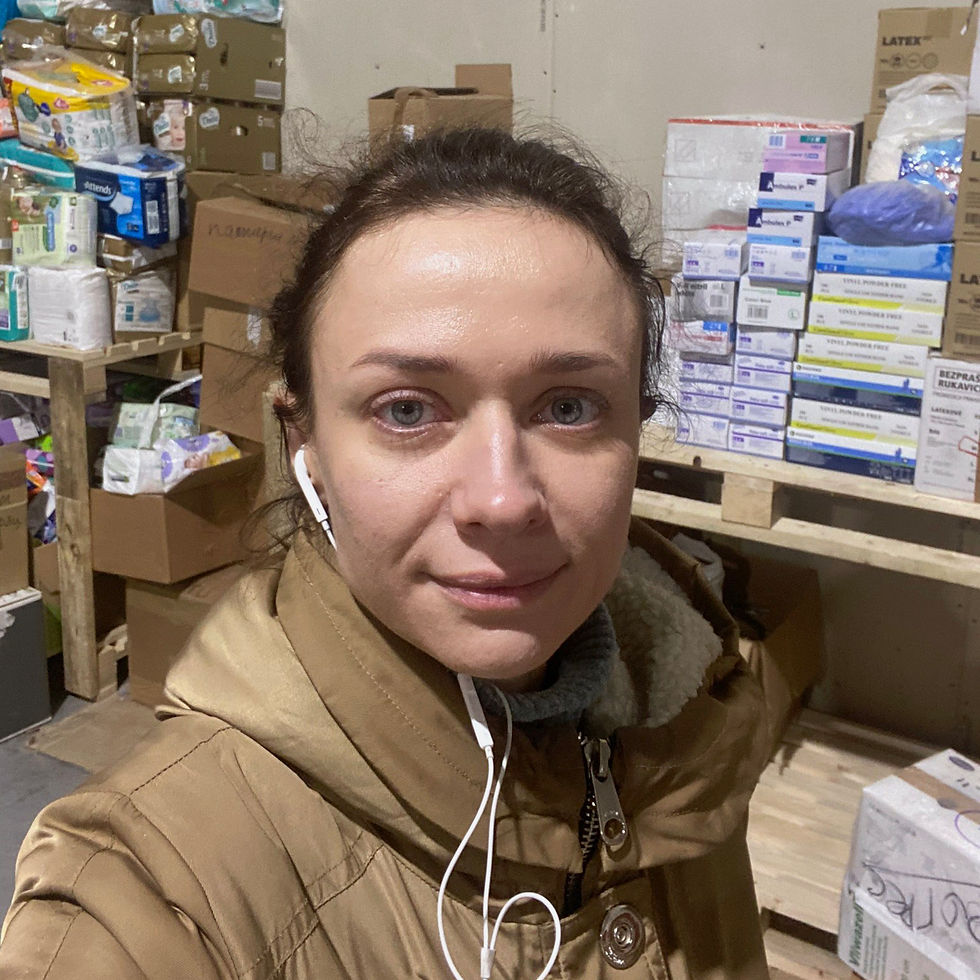Kyiv health worker: «Face-to-face and digital consultations equally important»
- Cristina Danescu

- Sep 8, 2022
- 4 min read
Specialized in chronic pain, neurologist Oleksandra Shchebet (37) had to expand the type of care she provides to people in Kyiv. «Anxiety, depression and PTSD is why most seek a doctor now. Many of us have been taking courses to be able to do crisis counseling,» she says.

Oleksandra Shchebet got involved with Health Tech Without Borders (HTWB) in June. The organization offers online courses and other educational resources to both healthcare personnel and the public. Among other things the HTWB team needed translators during webinars to translate from English to Ukrainian.
Shchebet was ready to contribute. She had 15 years of experience as a neurologist, psychotherapist and medical director of a private clinic in Kyiv.
«As a clinician in Ukraine, I experience the needs of people on a daily basis. After the war started in February I continued to offer consultations to people digitally, mostly pro bono» says Shchebet.
There is no national digital health platform that can be used by clinicians to message and have video consultations with patients. So, she uses whatever apps and technical solutions that are available. It also depends on what the person on the other end preferres.
«Making a call, using voice or text messages, using systems like for example WhatsApp. If it is possible for me to choose I prefer Zoom or Skype, because I can also see the body language.»
Staying connected is important
A successful video meeting depends on a fast enough internet and sufficient bandwitdth. In many rural areas people are facing a lack of reliable internet. The number of internet users have been on the rise in Ukraine for the past 15 years. Now about 75 % of the population is online according to the World Bank. Mobile service providers have connected bomb shelters so people can reach others when they must seek refuge.
In Kyiv, connectivity is in general good. And yet, the usual face-to-face consultation still makes up half of Shchebet’s meetings with patients.

Volunteer work: Sorting humanitarian aid and supplies in a storage room in Lutsk, March 2022.
«Following Russia's invasion, me and my family fled to Lutsk in the northwest, where I’m originally from. It felt like a safer place at the time. After returning to Kyiv in June I got back to my practice. Now, it’s not as intense since maybe only half of the population still lives here,» she says.
If she has met the patient before, she says it works well to meet online. But if the patient is new to her, she would like to see them face-to-face.
Needed upskilling to give counseling
When people came to see her, Shchebet realized she too needed something.
Her professional interest as a neurologist was chronic pain. But it was not back pain people mainly experienced.
«People are suffering from anxiety, depression and post-traumatic stress disorder (PTSD). They may develop symptoms of PTSD a few months after they have had a traumatic exposure. Many have been living with trauma, mental pains like flashbacks, insomnia, isolation and depression for over half a year,» she says.
«People are suffering from anxiety, depression and post-traumatic stress disorder (PTSD). They may develop symptoms of PTSD a few months after they have had a traumatic exposure. Many have been living with trauma, mental pains like flashbacks, insomnia, isolation and depression for over half a year,» she says.

Together with one of her colleagues at the clinic Spravno, Prof. Vadym Biloshytsky. Photo: Private.
She explains how it is common in Ukraine for some to say «I’m not feeling well, it’s the nerves».
«It is part of the legacy of the Soviet era. Having mental health problems was often considered weak, also in the health sector. Then it was easier to train neurologists that people could talk to, to treat these feelings as physical conditions – like dementia, epilepsy and stroke.»
To better talk and advise patients about their feelings, she and some colleagues have taken courses and followed the mental health webinars offered by Health Tech Without Borders. Some health professionals in her team have began working as crisis psychotherapists – a different field than the one in which they were specialized.
In addition, she sees many patients with chronic conditions.
«This is what happens when people do not receive their usual follow-up from the doctor, their necessary medication. Hyperthyriodism, diabetes, high blood pressure – without the right medication, it causes damage to the whole system.»
Mental healthcare and removal of stigma
She underlines how important it is, that the world and humanitarian actors continue to support the Ukrainian people and access to health services. The situation in some regions is more stable. However, strong global cooperation is needed to persevere in the difficult crisis.

Photo: Unsplash
Covid-19 used to be the greatest threat, but the war leads to a chain reaction of negative effects.
«In the future, there will be many more with mental health problems. Children will become adults. Soldiers will return home and their trauma will affect their lives, families and communities. There will be a critical pressure on psychologists and other health personnel. We do not have enough psychologists or therapists in Ukraine. That means we are in a serious and ongoing health emergency,» she says.
Sometimes she meets a person an realizes they need to go see a therapist.
«But then they refuse to do it. They keep saying it's the heart or the stomach. In our country, there is still a stigma attached to suffering from mental illness. It is a mindset we must change.»
Help us help
Want to support our nonprofit, Health Tech Without Borders?
You can help us support the Ukrainian people by making a donation on this site. Your donation will contribute to this humanitarian initiative and improve people’s access to healthcare.
Any amount is greatly appreciated.




Comments